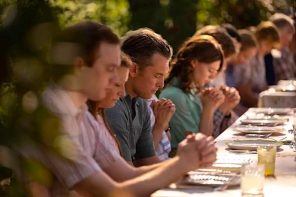Modern Family, which won the Emmy award for best television comedy after its first season, just turned on religion. But what was really interesting about this episode, called “Earthquake,” was the way it did it, demonstrating not just a cultural ease with secularization, but also a nod to the very American turn to nature religion.
“…God in Nature, Amongst His Works”
For the uninitiated, the extended clan featured on the wildly popular show offers ethnic diversity, step- and adopted children, a gay couple, and quirky, technologically sophisticated kids and teens. The adults must adapt not only to this diversity and to changing values, but in this recent episode, to the question of religious difference and even disbelief.
Last week’s show begins with the easygoing family patriarch, Jay Pritchett (Ed O’Neill), declining to attend church with his younger, and notably gorgeous, Colombian wife, Gloria (Sofia Vergara). When she protests, Jays replies, “Look, you feel God in Church, which is great. I feel God out in nature, amongst his works.” After complaining that he always has some excuse, Gloria demands, “If you’re done with Church, just say it.”
Jay promptly replies, “I’m done with church.”
The old adage that one should write what one knows is worth remembering here: while fiction, these scripts flow from the collective experiences of the writers. Moreover, sitcoms are usually filmed in front of live audiences, allowing the artists to see if the jokes are working. Reflecting on my own experience and that of many people I know, I thought that hearing this line, there would likely be millions of Americans who have similar experiences and tensions. I also expected that Gloria would not give up easily.
She doesn’t. “Don’t say that,” she responds angrily, with eyes looking heavenward, as though expecting retribution.
“Look, I’m not going to church anymore. It’s not the end of the world. Let’s not make a big deal about it.”
But just as he finishes his sentence, everything starts to shake. An earthquake.
I’ll resist the temptation to explore theorists who suggest that the root of religious perception lies in fear of predators and natural disasters, and turn instead to the next stage of the dispute.
Gloria insists, of course, that the earthquake is a sign from God.
“You’ve got to be kidding,” Jay responds, mockingly, then looking skyward he calls out, “God, if you’ve got a problem with me going golfing, send me a sign, send me some lightening, put on a show.”
“Don’t talk to God like that!” Gloria demands, fearfully. But Jay replies, in his usual low-key manner, that if God wanted to express his displeasure, “he would be a little more specific” than shaking the entire city.
I was struck by the way Gloria’s views were depicted as superstitious and silly. I wondered while watching, what does this mean? Is belief in the interventionist God of traditional religion under siege in popular culture? Are the new atheists, abetted by comedians like Bill Maher and Julia Sweeney, providing cultural running room for atheists and strong agnostics; those who aver, ‘I don’t know and neither do you’? (Sweeney’s Letting Go of God is currently on Showtime.)
But back to Modern Family, and this episode’s second act, in which Manny (Rico Rodriguez), Jay’s stepson, weighs in on Jay’s nature spirituality.
On the one hand, he explains, he likes “what Jay said about God being in nature,” and opts to join Jay for a day at the golf course—instead of church.
But once there, Manny begins to pester Jay with the obvious existential questions that arise for those questioning theism. He asks, “So aren’t you worried about hell?”
Jay answers: “Let me let you in on a little secret, there is no hell.”
After first expressing delight with this idea, the bright youngster soon begins to wonder about how heavenly heaven would be if all the bad people were there too.
Answering hastily, Jay responds that the bad people are in a different part of heaven. After more pestering from Manny, Jay refines his idea: a lake of fire surrounded the bad people.
Whereupon Manny observes perceptively that Jay’s heaven had gone to hell.
“Nothing Mystical about an Earthquake”
Implicit in the exchange is the assumption on the part of the sitcom’s writers that it makes more sense not to believe in heaven than to count on celestial reward. There are, of course, the perennial conundrums posed by the heaven notion; some of which are broached in this episode. And heaven seems decreasingly plausible to scientifically-oriented modern people, aware of how deeply we can now peer into the universe with our sophisticated optics, and informed by an evolutionary understanding for the earth’s biocomplexity.
After more questions and answers, it becomes clear that Jay is no theist, but he acknowledges that his idea, that there was no heaven, was “just a hunch.” Manny is freaked out, begins to hyperventilate, and complains, “You’re playing pretty fast and loose with my soul.”
Then Jay speaks directly to the camera, in one of the faux-documentary interludes that punctuate the show. “There is nothing mystical about an earthquake,” Jay insists. “Pressure builds, and you just hope there is not too much damage. But it helps you realize what matters, and for me, that’s my family.”
At these words, cut to Manny and Jay in front of a church. Before turning to go inside, Manny tells Jay that he would “put in a good word for him.” After this, Jay’s riff on what really matters continues. He adds: what really matters is “my family [mischievous pause] and golf.”
Laughing while delivering this punchline, Jay is then shown turning away from church’s door, obviously preferring his version of the church of the great outdoors. He is laughing, presumably at us, the viewers, who have been led to think for a moment that he might, for the sake of his family, return to church.
Many modern families have dynamics like this, wherein some continue in their devotion to conventional religious forms, while others are turning from them. Since the 19th century and especially in recent decades, increasing numbers of these exiles from American culture’s most prevalent forms of religion are finding their spiritual meaning in the natural systems we belong to and depend on.
We should not make too much of one sitcom, of course, but this one does raise interesting questions: Is Western antipathy toward nature spirituality eroding? Is it becoming more conventionally acceptable to mock religion? Does nature religion hold particular appeal for post-theists, or agnostics? Will we see in our popular media more expressions of nature spirituality, going forward?
I would not argue that golfing should be understood as a new nature religion. I do think, however, that this Modern Family episode reflects a slowly unfolding quasi-secular trend in America, where increasing numbers of people consider our biosphere, rather than someplace beyond it, as the ultimate sacred place.




